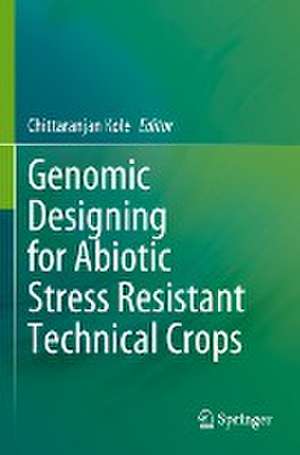Genomic Designing for Abiotic Stress Resistant Technical Crops
Editat de Chittaranjan Koleen Limba Engleză Paperback – noi 2023
The ten chapters each dedicated to a technical crop and one chapter devoted to a crop group in this volume elucidate different types of abiotic stresses and their effects on and interaction with the crops; enumerate the available genetic diversity with regard to abiotic stress resistance among available cultivars; illuminate the potential gene pools for utilization in interspecific gene transfer; present brief on classical genetics of stress resistance and traditional breeding for transferring them to their cultivated counterparts; depict the success stories of genetic engineering for developing abiotic stress-resistant crop varieties; discuss on molecular mapping of genes and QTLs underlying stress resistance and their marker-assisted introgression into elite varieties; enunciate different genomics-aided techniques including genomic selection, allele mining, gene discovery, and gene pyramiding for developing adaptive crop varieties with higher quantity and quality of yields, and also elaborate some case studies on genome editing focusing on specific genes for generating abiotic stress-resistant crops.
| Toate formatele și edițiile | Preț | Express |
|---|---|---|
| Paperback (1) | 1119.14 lei 6-8 săpt. | |
| Springer International Publishing – noi 2023 | 1119.14 lei 6-8 săpt. | |
| Hardback (1) | 1124.42 lei 6-8 săpt. | |
| Springer International Publishing – noi 2022 | 1124.42 lei 6-8 săpt. |
Preț: 1119.14 lei
Preț vechi: 1364.81 lei
-18% Nou
Puncte Express: 1679
Preț estimativ în valută:
214.17€ • 232.56$ • 179.91£
214.17€ • 232.56$ • 179.91£
Carte tipărită la comandă
Livrare economică 22 aprilie-06 mai
Preluare comenzi: 021 569.72.76
Specificații
ISBN-13: 9783031057083
ISBN-10: 3031057082
Ilustrații: XXX, 457 p. 28 illus., 25 illus. in color.
Dimensiuni: 155 x 235 mm
Greutate: 0.74 kg
Ediția:1st ed. 2022
Editura: Springer International Publishing
Colecția Springer
Locul publicării:Cham, Switzerland
ISBN-10: 3031057082
Ilustrații: XXX, 457 p. 28 illus., 25 illus. in color.
Dimensiuni: 155 x 235 mm
Greutate: 0.74 kg
Ediția:1st ed. 2022
Editura: Springer International Publishing
Colecția Springer
Locul publicării:Cham, Switzerland
Cuprins
see proposal attached, ToC incl.
Notă biografică
Prof. Chittaranjan Kole is an internationally reputed scientist with an illustrious professional career spanning over thirty-seven years and original contributions in the fields of plant genomics and biotechnology leading to the publication of more than 150 research articles in globally leading journals. He has edited over 160 books for the leading publishers of the world including Springer Nature, Wiley-Blackwell and Taylor & Francis Group. His works and editing acumen have been appreciated by seven Nobel Laureates including Profs. Norman Borlaug, Arthur Kornberg, Werner Arber, Phillip Sharp, Günter Blobel, Lee Hartwell and Roger Kornberg. Previously he was a Visiting Professor in The Pennsylvania State University and Clemson University. He also served as the Vice-Chancellor of the BC Agricultural University in India. He is also the President of the International Climate-Resilient Crop Genomics Consortium (ICRCGC), International Phytomedomics and Nutriomics Consortium (IPNC) and Genome India International (GII).
Textul de pe ultima copertă
This book presents deliberations on molecular and genomic mechanisms underlying the interactions of crop plants to the abiotic stresses caused by heat, cold, drought, flooding, submergence, salinity, acidity, etc., important to develop resistant crop varieties. Knowledge on the advanced genetic and genomic crop improvement strategies including molecular breeding, transgenics, genomic-assisted breeding, and the recently emerging genome editing for developing resistant varieties in technical crops is imperative for addressing FHNEE (food, health, nutrition, energy, and environment) security. Whole genome sequencing in many of these crops followed by genotyping-by-sequencing has provided precise information regarding the genes conferring resistance useful for gene discovery, allele mining, and shuttle breeding which in turn opened up the scope for 'designing' crop genomes with resistance to abiotic stresses.
The ten chapters each dedicated to a technical crop and one chapter devoted to a crop group in this volume elucidate different types of abiotic stresses and their effects on and interaction with the crops; enumerate the available genetic diversity with regard to abiotic stress resistance among available cultivars; illuminate the potential gene pools for utilization in interspecific gene transfer; present brief on classical genetics of stress resistance and traditional breeding for transferring them to their cultivated counterparts; depict the success stories of genetic engineering for developing abiotic stress-resistant crop varieties; discuss on molecular mapping of genes and QTLs underlying stress resistance and their marker-assisted introgression into elite varieties; enunciate different genomics-aided techniques including genomic selection, allele mining, gene discovery, and gene pyramiding for developing adaptive crop varieties with higher quantity and quality of yields, and also elaborate some case studies on genome editing focusing on specific genes for generating abiotic stress-resistant crops.
The ten chapters each dedicated to a technical crop and one chapter devoted to a crop group in this volume elucidate different types of abiotic stresses and their effects on and interaction with the crops; enumerate the available genetic diversity with regard to abiotic stress resistance among available cultivars; illuminate the potential gene pools for utilization in interspecific gene transfer; present brief on classical genetics of stress resistance and traditional breeding for transferring them to their cultivated counterparts; depict the success stories of genetic engineering for developing abiotic stress-resistant crop varieties; discuss on molecular mapping of genes and QTLs underlying stress resistance and their marker-assisted introgression into elite varieties; enunciate different genomics-aided techniques including genomic selection, allele mining, gene discovery, and gene pyramiding for developing adaptive crop varieties with higher quantity and quality of yields, and also elaborate some case studies on genome editing focusing on specific genes for generating abiotic stress-resistant crops.
Caracteristici
Presents crop-wise compilation of advanced genetic and genomic techniques employed for crop improvement
Includes comprehensive review on crop improvement of 13 important technical crops and 2 technical crop groups
Chapters authored by eminent scientists
Includes comprehensive review on crop improvement of 13 important technical crops and 2 technical crop groups
Chapters authored by eminent scientists
